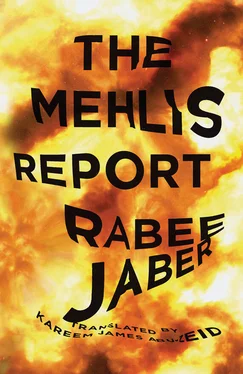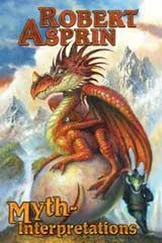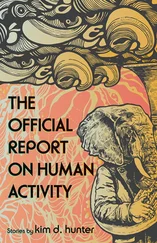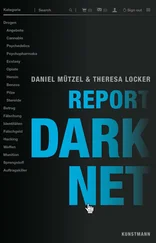The rain pours onto the city. The power goes out with the first few drops. Children start shouting — they rush out to the balconies, clapping and screaming for more rain. Cars honk their horns. In just a few moments, the streets become rivers. The gas flame beneath the saucepan lights the kitchen with a dim blue glow. The two of them are seated beside one another. Cecilia laughs, delighted by the rain. This is the first rainfall. The smell of cement fills the air, and the smell of earth. The city is washing the summer and all the summer’s dust from its body. The air is being washed clean. The power has gone out, but that’s normal for this city. It will come back on in a little while. There are no planes bombing us these days, and the port is full of ships bearing fuel. A little while later, the generators start up again and the power comes back on. The music of the rain among Beirut’s buildings, the cries of exuberant children: the sounds of a city changing, being purified.
They embrace, then head toward the balcony, moving slowly. They don’t step outside. They open the balcony door and stand there, on the threshold separating the inside world from the one outside. The raindrops fall in at an angle, shimmering silver: the balcony tiles are all wet. The rain comes down like needles, like needles and thread, starting and stopping. Across the way, the mall’s reserve generators have started up, and the mall lights have come on. But the streetlights — the municipality lights — remain dark. Darkness, then light. Light that comes and casts itself onto the rain and the darkness. The raindrops glisten. The light reflects off them into countless luminescent beads, as if the sky were shedding both water and sparks. The music of water and electricity lights up the air. And light from the mall reflects off the dark buildings, off their windows, off the glad and hopeful faces staring in wonder at the rain from behind glass.
The beans aren’t for tonight. Once they’ve cooled off, they put them in the fridge for tomorrow. They sprinkle some golden olive oil on them and leave them for tomorrow. Cecilia loves the colors of that dish. Red tomatoes with green beans and white onions and garlic, and then the golden drops of oil. Green beans and olive oil only taste good the next day, and only if they’re served cold. A night in the fridge lets out the flavor, and the different tastes blend together. Saman loves eating that dish with raw onions. Cecilia prefers cucumbers.
Tonight they drink some wine and have a light meal of cheese and sandwiches. Cecilia says she’s gained weight the past few days. Saman says knowledge is no good for the stomach — he’s been growing a potbelly ever since he started learning to cook. Cecilia laughs because you can still see his ribs poking out. He swims for an hour or two every single day. And she doesn’t know how many hours he spends walking around.
In bed, she asks him whether he’s made an appointment for his annual physical. He laughs as he moves her hair from her face, and asks why she’s thinking about the heart right then. She pulls her hair together behind her head, and, just as she’s securing it with her white hair tie, the electricity comes back on throughout the house. The blinding light catches her off guard.
The wine is making him drowsy, as is the bed. He falls asleep for a half hour. While he’s sleeping, she covers herself with a blanket and goes out onto the balcony. The rain has stopped. She lifts her head, and the scene takes her breath away: flowing milky clouds climbing the pure night sky; and a full white moon rising above the clouds, lighting up their edges, lighting up the sky. The clouds look like mountains. At their summits the sky is clear, utterly sheer and diaphanous. The moon looks down at Cecilia standing on the balcony. Her hand is on her stomach and her bare shoulder glistens in the light. Cecilia stays like that: she’s praying.
The land of the dead is divided into seven regions. And each region is itself divided into seven other regions, and in this way.
I don’t know those regions. And I have no real desire to travel to them and discover their cities and villages, their mountains and rivers and plains. First of all, traveling’s not easy. And second, reading is more enjoyable. The journey from the bookshelf containing the volumes that start with the letter “A” to the bookshelf containing the volumes that start with “B” takes years and years, and you can discover endless regions from one volume to the next. That’s what we do here. If you disregard our longing for the land of the living, our deepest desire is to read. Those who’ve been here a long time even stop writing eventually. They write a lot at first, then they stop. Anyone who keeps writing is considered strange. Those “strangers” — most of them — were not touched by the yellow-eyed animal when they first arrived in the land of the dead. Longing reaches its peak in them.
What I know about these things I know from the following: (1) from personal experience; (2) from reading; (3) from Johannes, when he actually speaks. Johannes only rarely speaks, but when he does the words flow out of him rapidly. I learn more from a half-hour with him than I could learn from talking to the others for years.
No censuses have ever been carried out in this world, but there’s little doubt that the number of residents is huge. There are regions in which the dead are so densely populated that you cannot breathe: the air becomes thin above the people’s heads, and you have to gasp just to get some air. The living know this feeling too. For example, when you’re standing in a crowd of thousands at a demonstration in a packed square. Or if the power goes out and you get stuck in an elevator. But on the other hand, there are also cold and distant regions where just a few people settle. They cut holes in the surface of the ice to fish. They pass all of winter in their igloos, never coming out. The storms raging outside don’t bother them, nor do the snowfalls that blanket the vast white fields. They keep small fires going inside, and they have books. Each reader sinks into his book and forgets where he is.
Johannes once traveled to those regions. He doesn’t talk about them much. But when he does mention them, you can tell he knows those places with all five of his senses, and not merely with the knowledge of books. But I might be imagining this. There have been other times when taking his words too literally has led to misunderstandings.
Although we spend a lot of time in the same place, I don’t know much about his life. He doesn’t talk about his family. I only know that his grandfather used to own the Clemenceau Forest (by the American University), and that he sold that small forest to the French Embassy; then he built a house with arches, a three-story house on the hill overlooking the Wadi Abu Jamil district. When the grandfather died his son — Johannes’s father — finished the project. He put a tiled roof on the house. And he brought in the master craftsman Niman Louwendes, who made ornate shutters for the windows, the likes of which even Beirut’s palaces had never seen before. He put tiled awnings above the small upper windows. The house’s windows were made of stained glass: circles, triangles, squares; red, blue, green. As Johannes was telling me about the family house, I thought he must be saying those things because he’d read what I’d written. Johannes always reads my papers before putting them in the archive. When he finished describing his house I told him that I too — as I had written — had lived my entire life in an old house with tall ceilings and round stained-glass windows.
Johannes nodded his head and said nothing.
While I was alive, I never imagined I’d one day find myself in this world. I always thought a person’s life ended when they gave up the ghost. You breathe your last breath, and you die. If you’re Christian they wash your body with a sponge and soap and water and dress you in a clean robe that smells like detergent and put you in a coffin. If you’re Muslim they wash you with a sponge and soap and water and wrap you in a clean shroud and. I never thought about these things much, but I always knew them. I died long before I was old enough for my hair to turn white. I never saw wrinkles spread across my face; and death never preoccupied me, even though I did think about it. I thought about it because of the war, and because of my grandfather. He died picking mulberries from our tree. A tree of white mulberries: our relative Baseel Yarid always used to say that those were the sweetest white mulberries in the world. He told us he once saw a bonsai mulberry in a Buddhist temple in Kyoto, Japan. The tree was a hundred years old and the size of a small child. Its sumptuous wood was soft and glistening, like polished ivory. Its leaves were a bit smaller than the leaves of our mulberry, and every year at the end of summer a handful of honeyed white fruit would appear among its leaves. The monks believed those few fruits came from Buddha. A single fruit would fill your belly with delight for a whole year.
Читать дальше












